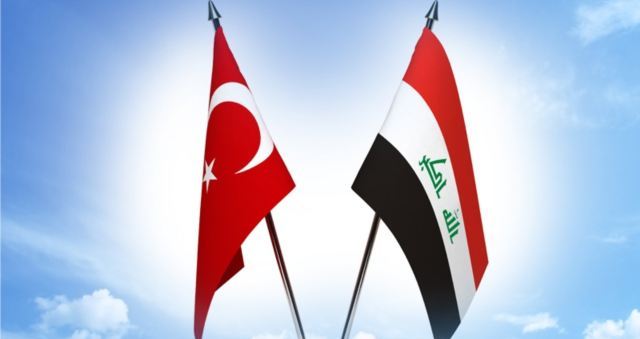
Shafaq News
In a move
hailed as a “historic solution” to Iraq’s deepening water crisis, Baghdad and
Ankara finalized an accord on November 2, 2025, pledging substantial investment
in the water sector and marking what many view as a pivotal moment in the
country’s long struggle to secure its water future. Yet, experts caution that
while the agreement offers immediate relief, it may not represent the ultimate
solution Iraq urgently requires.
Oil Buys
Water
The newly
signed agreement establishes a financial mechanism linking Iraq’s oil exports
to Turkiye with funding for water infrastructure projects in Iraq. Under the
arrangement, revenues will be deposited into a dedicated account to finance
projects implemented by Turkish companies. Iraqi officials will oversee the
program through a specialized committee, managing tenders and payments
exclusively from the funds generated by this mechanism.
Read more: Iraq and Turkiye finalize infrastructure deal: What we know
Turkish
Foreign Minister Hakan Fidan described the agreement as “the largest
infrastructure investment in Iraq’s history.” In turn, his Iraqi
counterpart, Minister Fuad Hussein, referred to it as a “first-of-its-kind
partnership on water management,” emphasizing its “unprecedented scale and
structure.”
The deal
immediately targets three dam-construction and three land-reclamation projects
to address Iraq’s urgent need for water infrastructure modernization. These
projects will focus on restoring irrigation systems, improving water quality,
reducing river pollution, and rehabilitating farmland severely affected by
neglect, as part of a broader plan to expand sustainable water governance
practices.
However, a
critical feature of the deal is that Turkiye will supervise all water releases
and dam operations for the first five years before transferring responsibility
to Iraqi authorities, raising concerns over Iraq’s long-term control of its
water resources.
Missed 2010
Deal
While the
agreement has been seen as a breakthrough, Iraqi economist Ziad al-Hashemi
observed that this situation could have been avoided years earlier.
In a post on
X, Al-Hashemi highlighted that Iraq missed a pivotal opportunity in 2010 to
negotiate a more advantageous deal with Turkiye, following preliminary
discussions with Turkish President Recep Tayyip Erdogan.
At that
time, Iraq could have secured a stable water quota from Turkiye in exchange for
joint economic cooperation, including inviting Turkish agricultural companies
to modernize Iraq’s irrigation systems and rehabilitate farmland in central and
southern regions.
Al-Hashemi
argued that the 2010 deal would have provided lasting benefits, including
higher agricultural output for domestic consumption and export, job creation,
training for young workers in modern farming techniques, as well as additional
state revenue.
He also
noted that Iraq’s leadership, under then Prime Minister Nouri al-Maliki,
rejected the deal over concerns it might give political leverage to a rival
faction before the 2010 elections.
“Now, Iraq
faces a deal that is more costly and less certain,” Al-Hashemi warned,
stressing that tying water projects to oil exports could compromise Iraq’s
resource autonomy.
Read more: A century of promises: Iraq’s water diplomacy with Turkiye and Iran
At What
Cost?
One of the
most debated aspects of the agreement is the oil-for-water financing mechanism.
Iraqi experts, including energy analyst Dr. Ahmad Jassim, have raised concerns
about linking Iraq’s oil revenues to a deal “that largely benefits Turkiye.”
“Iraq’s oil
wealth should be deployed strategically for domestic development rather than
exchanged for water relief from a neighboring country,” Jassim remarked to
Al-Hadath.
Dr. Omar
al-Hasan, another energy analyst, shared similar reservations. Speaking to TRT
Haber, a Turkish news network, he pointed to existing inefficiencies in Iraq’s
management of oil revenues. “By connecting those revenues to a deal with
Turkiye, the country risks surrendering control over one of its most valuable
assets.”
A central
criticism of the deal is the potential sale of Iraqi oil at a discounted rate
to fund water infrastructure projects, with both analysts warning that, given
persistent corruption and mismanagement in Iraq’s oil sector, such an
arrangement could leave the country more exposed to external pressures.
Legal Edge
Lost
Economic
concerns are closely intertwined with legal vulnerabilities. Eco Iraq, an
economic observatory based in Baghdad, sharply criticized the government for
finalizing the water accord, describing it as a decision that weakens Iraq’s
legal standing and limits its ability to defend its water rights under
international law.
In a
statement, Eco Iraq highlighted that Baghdad already has numerous legal and
institutional frameworks — including 14 key international, bilateral, and
environmental mechanisms — that could have been mobilized to secure its fair
water share from the Tigris and Euphrates.
These
include established international conventions such as the 1997 UN Convention on
the Law of the Non-Navigational Uses of International Watercourses, the 1966
Helsinki Rules, and the 2004 Berlin Rules, which collectively outline
principles of equitable water sharing and the prevention of significant harm
among riparian states.
At the
bilateral level, Iraq could have relied on existing accords, including the 1946
Iraq–Turkiye Protocol, the 1978 Protocol on Economic Cooperation, and the 1987
Turkiye–Syria Agreement, later expanded to include Iraq — along with decades of
joint Iraqi–Turkish committee records that remain legally relevant.
Additional
measures noted by the observatory included invoking the international law
principle of “significant harm,” pursuing regional arbitration under the UN or
World Bank, as well as employing environmental agreements such as the Paris
Agreement and the Convention on Biological Diversity to frame Turkiye’s
upstream dam activity as a cross-border ecological issue.
By bypassing
these legal and diplomatic avenues, Eco Iraq argued that Baghdad effectively
handed Ankara a political and legal advantage in a dispute that continues to
threaten Iraq’s long-term water security and economic stability.
Drought
Deepens Crisis
Despite
hopes that the agreement will alleviate the crisis, Iraq’s water situation
remains critical. The country is experiencing its worst drought in nearly a
century, with water levels in the Tigris and Euphrates rivers down by 27% from
last year and national reserves plummeting to a record 10 billion cubic
meters—far below the seasonal average of 18 billion.
A 2024 UN
report indicated that 90% of Iraq’s surface water is contaminated, heightening
the scarcity of clean water. Around 37,000 people have also been displaced due
to climate-induced water shortages, while regions such as Basra, Maysan, and
Dhi Qar face rising salinity and pollution in their water supplies.
Read more: From drought to saltwater: Iraq’s deepening water crisis
Although the
new agreement represents progress, many experts remain cautious about its
effectiveness. Abdul Mutalib Rafaat, a water-resources specialist at Garmian
University, noted that past Iraq–Turkiye deals delivered limited results.
Water
releases from Turkiye increased temporarily in mid-2025, but flows soon
declined, further raising doubts about whether this latest deal will achieve
sustained improvements.
Previous
agreements, such as the 2014 Memorandum of Understanding on Water Resources
(officially enforced in 2021), faced similar hurdles due to political tensions,
diverging national interests, and weak implementation mechanisms, preventing
them from meeting their objectives fully.
Rafaat also
raised concerns that the current deal, “while politically advantageous for
Turkiye, may limit Iraq’s sovereignty over its water resources.” The absence of
enforceable quotas, clear timelines, and robust monitoring raises uncertainty
about Iraq’s capacity to manage its water independently.
Can the Deal
Deliver?
While the
agreement may provide temporary relief, Iraq cannot rely solely on foreign
partners to resolve its water crisis. A 2025 report from the Ministry of Water
Resources urged a comprehensive domestic strategy — modernizing irrigation
systems, reconstructing water-storage infrastructure, and strengthening
national water governance.
Following
the November 2 signing, Iraqi Prime Minister Mohammed Shia Al-Sudani framed the
deal as a “sustainable solution” to the country’s water emergency. Its promise,
however, depends on transparency, clear monitoring frameworks, and rigorous
implementation that ties foreign assistance to measurable domestic reforms.
Written and
edited by Shafaq News staff.





